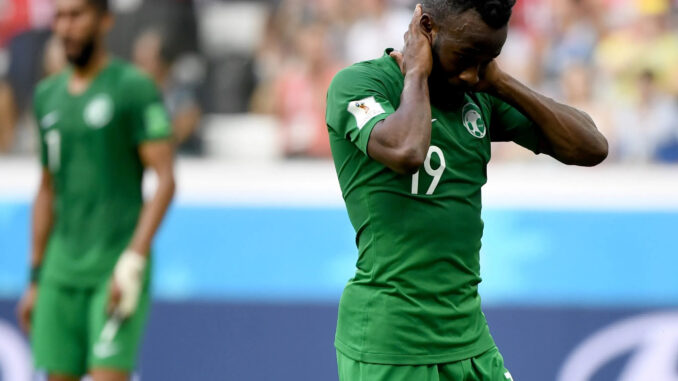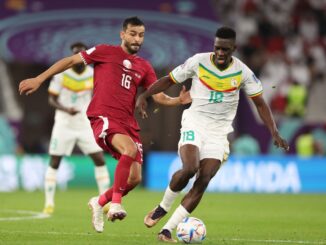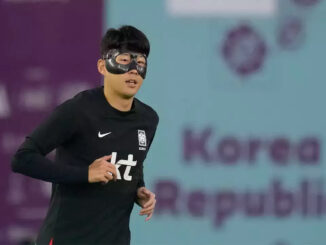

The Asian Game’s coverage of the FIFA World Cup Qatar 2022 is proudly sponsored by SMC.
In the bowels of Moscow’s iconic Luzhniki Stadium it took more than two hours for Saudi Arabia’s crestfallen players to drudge from the dressing room into the mixed zone; heads bowed with their eyes fixed on the floor, no one was in the mood for conversation.
What started out as an auspicious, hopeful occasion under clear June skies turned into heartbreak and humiliation for Juan Antonio Pizzi and his team as the Green Falcons slid almost helplessly to a 5-0 defeat against World Cup hosts Russia.
The atmosphere within the stadium had turned from a cauldron of nervous expectation for the home side into one of raucous revelry as the Russians launched a campaign that would ultimately sweep them all the way to the quarter-finals.
For Saudi Arabia, though, the loss was the continuation of an unwanted record: in five attempts to date the country has never won their first game at a World Cup. With Argentina lying in wait on Tuesday, the chances of that record continuing are significant.
The loss in 2018 extended their curtain-raising record to four defeats and one draw since making their debut at the World Cup in 1994, the performance that still represents the country’s best showing at the finals.
Defeat has become de rigueur for Saudi Arabia, extending all the way back to the country’s first-ever qualification for the finals.
Jorge Solari’s side slipped to a 2-1 loss at the hands of the Netherlands, but only after Fuad Anwar’s headed opener had been cancelled out by Wim Jonk from long range. Gaston Taument nodded in the winner with less than four minutes remaining after a horrendous error by goalkeeper Mohammad Al Daeyea.
That loss, though, was little more than a bump along the road towards the knockout phase of the competition. Saudi Arabia would go on to win their next two group games – against Morocco and Belgium – to advance to the Round of 16.
Four years later hopes of success were high in the aftermath of the surprise performance in the United States.
Carlos Alberto Parreira, four years after leading his native Brazil to the World Cup title, had been lured back to Saudi Arabia for a second stint as coach to replace Otto Pfister, the man who had qualified the country for the finals in France.
Going into the tournament as the reigning Asian Cup champions and in a group featuring the hosts as well as Denmark and South Africa, Saudi confidence was high.
But on a grey, overcast day in Lens in northern France a lacklustre performance was capped by a 1-0 loss against the Danes, with Marc Rieper’s second-half goal deciding a game in which the Saudis never really threatened.
It was a meek showing that personified that entire World Cup performance, with Parreira fired after the next game – a 4-0 loss against eventual champions France – and the Saudis went home at the end of the group phase.
Another four years passed with another qualification secured, this time for Korea/Japan 2002 and there was a determination to initiate a reset.
Officials around the team were eager to impress on anyone who would listen that France had been an aberration and this time would be different as the Saudis, now under Nasser Al Johar, sought to prove that 1994 had not been a fluke.
While the Saudis were no longer Asian Cup holders having lost out in the final in 2000 to Japan, many of the generation that had tasted success in 1994 were still involved, hoping for one last hurrah.
Sami Al Jaber, appearing at his third World Cup, was expected to carry the attacking threat while the team was bolstered in midfield by 2000 Asian Player of the Year, Nawaf Al Temyat.
Instead of Al Jaber leading the way to goal, it was Miroslav Klose who made the headlines under the roof of the Sapporo Dome, scoring a hat-trick as Rudi Voller’s side crushed their opponents 8-0. Michael Ballack, Carsten Jancker, Thomas Linke, Oliver Bierhoff and Bernd Schneider were all on target in the biggest win of the tournament.
In a precursor to the Luzhniki Stadium walk of misery 16 years later, the post-match formalities carried a solemnity that betrayed the country’s continuing disappointment and Saudi Arabia’s 2002 campaign never recovered.
If there is shaft a light cutting through the dark tale of Saudi Arabia’s opening day saga it came in Germany in 2006, at the majestic Allianz Arena on the edge of Munich. But even that was delivered with more than a dash of disappointment.
The Saudis went behind in their Group H meeting with Arab rivals Tunisia when Ziad Jaziri slammed the ball home, only for Yasser Al Qahtani’s magnificent first-time effort to ping off his boot at speed and into the roof of the net 12 minutes after the break.
Al Jaber, making his 161st appearance for his country, then looked to have won the game for the Saudis with six minutes remaining, slotting past Ali Boumnijel to become the first Arab player to score at three different World Cup tournaments.
But there was to be a late twist as defender Radhi Jaidi headed an equaliser through Mabrouk Zaid’s unconvincing attempted save in the third minute of injury time to extend Saudi Arabia’s winless streak to four from four.
The Saudis exited once more at the end of the group phase and it would be another 12 years before the nation qualified for the World Cup, when Pizzi’s team turned up in Russia in 2018.
In what will have felt like a recurring nightmare, Saudi Arabia went behind to Yury Gazinsky’s 12th minute header and never looked like finding a way back into the game as Pizzi’s players froze under the glare of the world’s attention. Denis Cherychev went on to score twice with Artem Dzyuba and Alexsandr Golovin also on the scoresheet.
There was a silver lining of sorts for Saudi Arabia, however, with Pizzi’s team picking up the country’s first World Cup win since their victory over Belgium in 1994 with a 2-1 win over Egypt. But once again they were eliminated at the end of the group phase.
Now Lionel Messi and La Albiceleste await at the Lusail Stadium on Tuesday with few expecting anything other than a continuation of the country’s winless streak continuing. The omens from past performances for Saudi Arabia are anything but positive.




